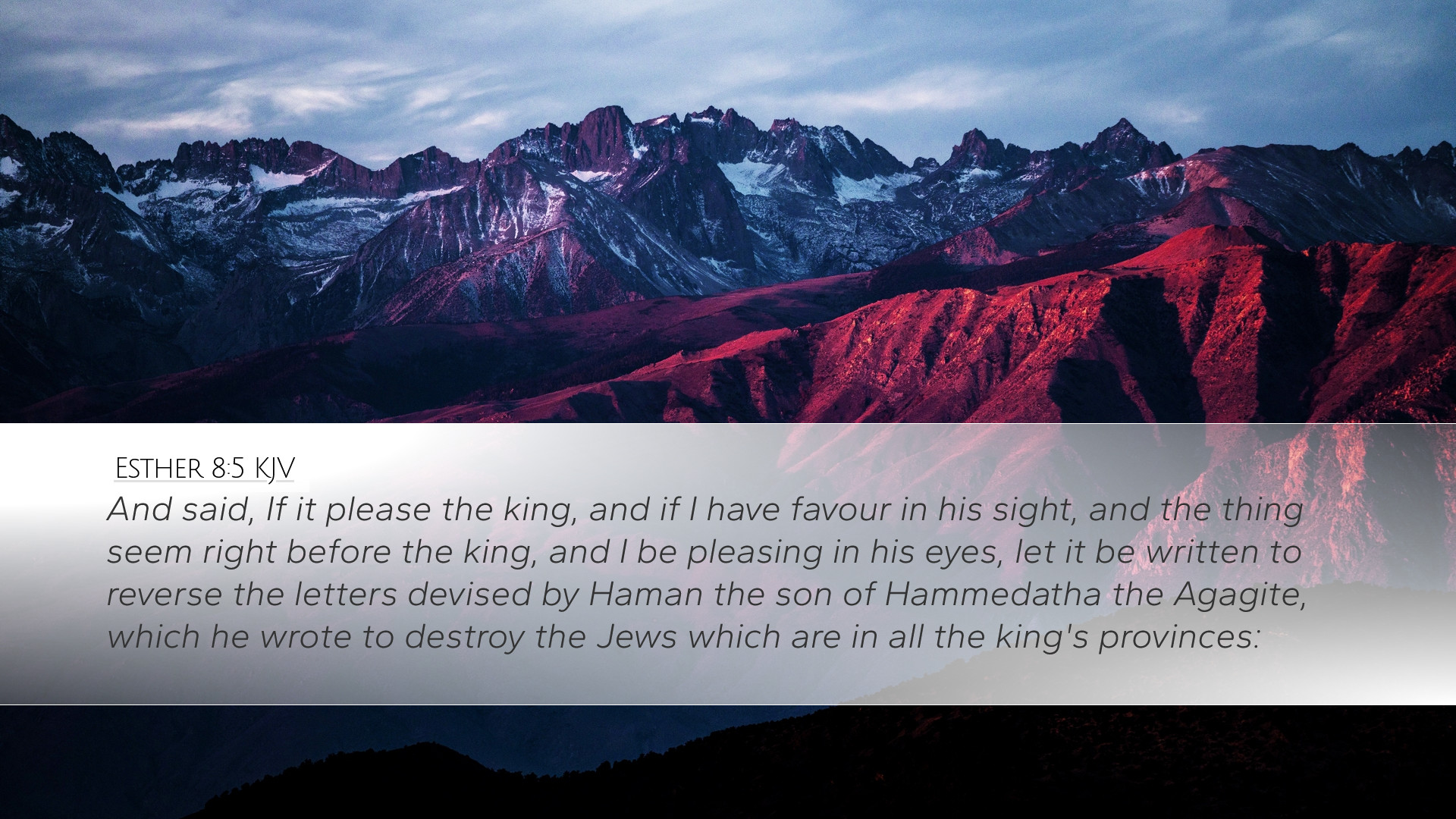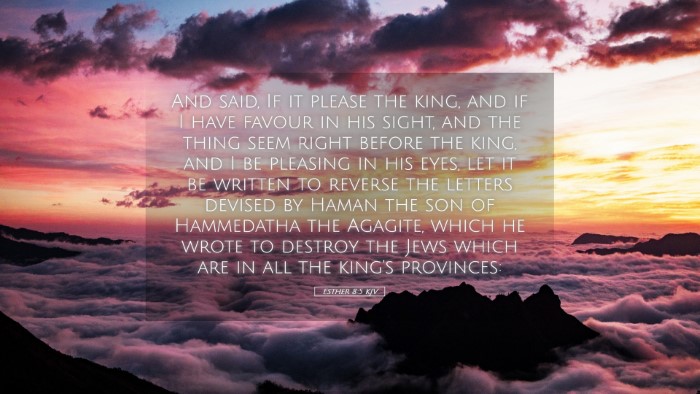Old Testament
Genesis Exodus Leviticus Numbers Deuteronomy Joshua Judges Ruth 1 Samuel 2 Samuel 1 Kings 2 Kings 1 Chronicles 2 Chronicles Ezra Nehemiah Esther Job Psalms Proverbs Ecclesiastes Song of Solomon Isaiah Jeremiah Lamentations Ezekiel Daniel Hosea Joel Amos Obadiah Jonah Micah Nahum Habakkuk Zephaniah Haggai Zechariah MalachiEsther 8:5
Esther 8:5 KJV
And said, If it please the king, and if I have favour in his sight, and the thing seem right before the king, and I be pleasing in his eyes, let it be written to reverse the letters devised by Haman the son of Hammedatha the Agagite, which he wrote to destroy the Jews which are in all the king's provinces:
Esther 8:5 Bible Commentary
Bible Commentary on Esther 8:5
Verse Context: Esther 8:5 reads, "And said, If it please the king, and if I have found favor in his sight, and the thing seem right before the king, and I be pleasing in his eyes, let it be written to reverse the letters devised by Haman the son of Hammedatha, the Agagite, which he wrote to destroy the Jews which are in all the king's provinces."
Introduction
The Book of Esther is rich in narrative and theological themes pertinent to both the ancient and modern contexts. Esther 8:5 is pivotal as it marks a significant turning point in the story of the Jewish people who faced annihilation. This verse encapsulates Esther's courageous appeal to King Ahasuerus (Xerxes) for the deliverance of her people.
Commentary Insights
Contextual Analysis
Esther's words are filled with humility and respect. Her approach to the king shows her understanding of the political dynamics at play. Matthew Henry highlights that Esther's plea was not only strategic but also emotionally charged as it reflects the desperation of her people. She acknowledges the king's authority while implementing a heartfelt request which embodies her role as an intercessor.
Interpretation of Esther's Appeal
In this verse, Esther presents a series of conditional phrases: "If it please the king," "if I have found favor," and "if the thing seem right." Albert Barnes notes that this reflects her careful approach, illustrating the importance of attitude in approaches to authority. This conditional style also serves to leave room for the king’s decision while showing Esther’s deep respect for him.
Theological Significance
Esther's request to reverse Haman's decree is a reflection of divine providence, displaying how God orchestrates events for the good of His people. Adam Clarke suggests that this demonstrates God's power to change situations, suggesting a theological framework where repentance and prayers can alter dire circumstances.
Plea for Divine Favor
The repetition of "if" emphasizes Esther’s vulnerability, recognizing that her favor in the king's sight is ultimately contingent on his will. Clarke notes that this serves as a reminder of the fragility of human favor and the sovereignty of God. Even in desperate circumstances, Esther’s faith shines through her request.
Haman's Letter
The reference to “the letters devised by Haman” reveals the gravity of the situation and the historical context of this decree against the Jews. Henry outlines the significance of Haman's intentions which were shrouded in malice and guided by pagan principles. The overturning of Haman's decree represents not only political reversal but also spiritual vindication for God's chosen people.
Pastoral Reflections
- Courage in Advocacy: Esther’s boldness in approaching the king serves as a model for spiritual leaders advocating for justice and mercy.
- The Power of Intercession: The importance of intercessory prayer resonates through Esther’s plea, showcasing that significant changes often begin with prayerful appeals for help.
- God’s Sovereignty: The story encourages a reflection on God’s providence in the lives of believers, affirming the belief that God is always at work, even in unsettling circumstances.
Conclusion
Esther 8:5 is a profound verse that encapsulates the core themes of favor, authority, intervention, and the sovereignty of God over human affairs. Insights from public domain commentaries reveal the layered meanings behind Esther's request, reminding us of the essence of faith, action, and divine providence in the face of evil.


